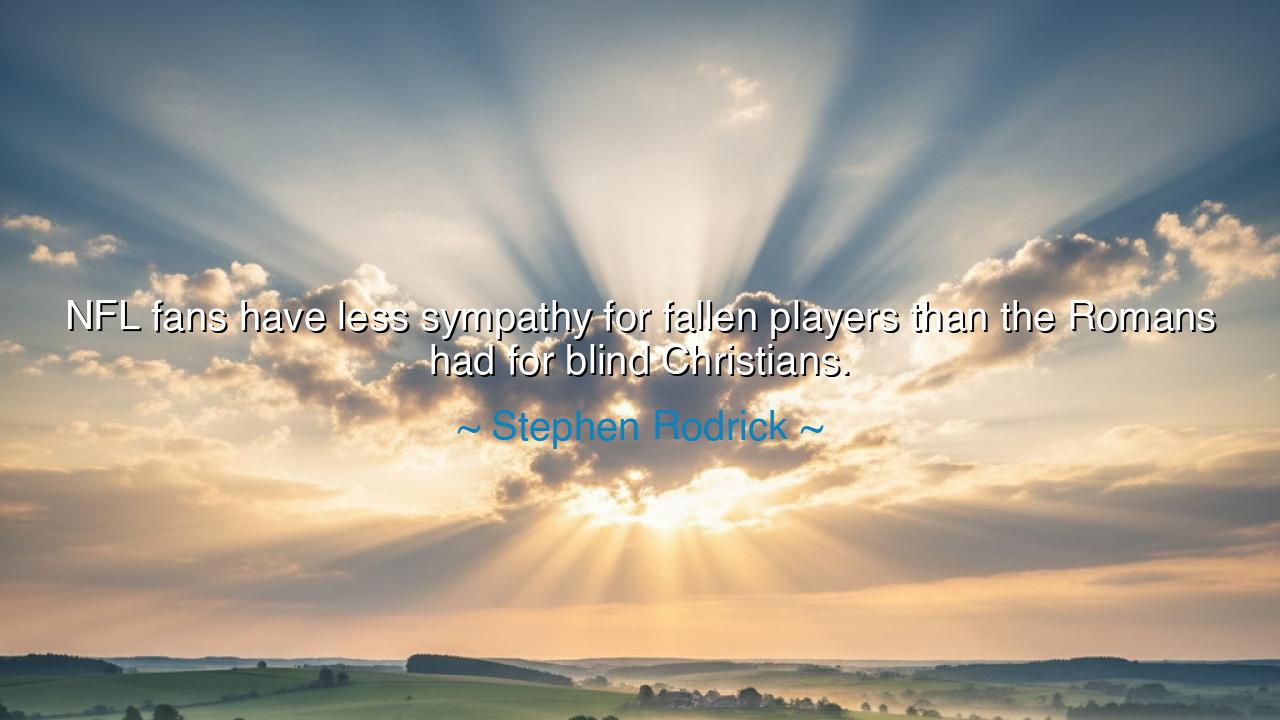
NFL fans have less sympathy for fallen players than the Romans
NFL fans have less sympathy for fallen players than the Romans had for blind Christians.






In the grand arena of life, where individuals rise to greatness only to fall from it, there is a timeless reflection on how society treats its heroes. Stephen Rodrick, in his provocative statement, “NFL fans have less sympathy for fallen players than the Romans had for blind Christians,” speaks not only to the shifting nature of empathy in modern culture but also to the way society chooses to honor and discard its icons. Rodrick’s words evoke the image of the Roman Empire, where gladiators and heroes were revered in life but often forgotten or even scorned in death. The Romans may have had more sympathy for the vulnerable, like the blind Christians, who were persecuted for their faith, but modern audiences often display little mercy for the very players who entertain them, once those players have fallen from the pedestal.
To understand this deeper, we must reflect on the ancient world, where the gladiatorial games served not only as entertainment but as a brutal reflection of the human desire to celebrate strength, even as it led to the demise of its champions. The Romans built their empire on the backs of warriors, yet their empathy for those who suffered under the system was not without limit. Gladiators, despite their revered status as symbols of courage and strength, were often cast aside once their usefulness had passed. Yet there remained a certain reverence for those who, in their defeat, still embodied the spirit of sacrifice—a symbol of the enduring struggle for honor even in the face of death. In this, the Romans showed mercy and respect, acknowledging the humanity behind the performances, a respect not always extended by modern fans of football or other high-profile sports.
In the age of Christian persecution, where early Christians were thrown to the lions or cast into the Colosseum, the blind and the vulnerable—those who could not defend themselves—were often seen as symbols of purity and faith. The Romans may have cast them aside, but there were those who, even in the face of such brutality, offered compassion. Early Christians were often hailed as martyrs, those whose suffering for a greater cause transcended their earthly existence. This notion of compassion for the oppressed was, in many ways, the beginning of empathy for those who suffer due to forces beyond their control. Yet, in modern times, we see how the public can turn on its fallen heroes, especially in sports, where the empathy once reserved for those who suffer has diminished in favor of judgment.
Consider, for example, the fallen athletes of today. The NFL, as Rodrick points out, provides a perfect example of this shift in public sentiment. The players who once commanded the adoration of millions are often cast aside when they are no longer useful—when their bodies are worn down by the very violence that once fueled their rise to fame. Fans, once loyal and adoring, can quickly turn their backs when a player falls from grace, whether due to injury, scandal, or poor performance. This is not a new phenomenon but a reflection of a deeper cultural trend: the idolization of strength and the subsequent rejection of vulnerability.
In ancient Greece, the Athenians revered their heroes, especially those who embodied the virtues of courage and honor. Yet, even in their admiration, there was a certain pragmatism that acknowledged the fallibility of heroes. The famous philosopher Socrates was sentenced to death, despite his wisdom and noble stance, because his beliefs were seen as a threat to the established order. His execution reflected a truth that still resonates today: even those who stand as symbols of virtue can be discarded once they no longer serve the interests of the masses. The same could be said for the NFL players who are loved one season and forgotten the next. The admiration of the masses can be fickle, a fleeting thing that fades with the passing of time.
Rodrick’s words serve as a powerful reminder of the fragility of public adoration and the impermanence of fame. While empathy for the fallen may be present in some corners of society, it is often overlooked in the pursuit of entertainment and spectacle. The lesson here is one of balance—that we must learn to value the humanity of the individual, not just the performance or the role they play in our lives. It calls on us to be mindful of how we treat those who have once been heroes, remembering that their sacrifices, whether physical or emotional, deserve our respect.
In our own lives, let us cultivate empathy and compassion, even for those who may appear to be at their lowest. Let us learn to honor the humanity of those who entertain us, who challenge us, and who inspire us, knowing that sympathy and understanding should not fade when their usefulness is exhausted. Like the Romans and Greeks, we must strive to see the whole person, recognizing both their strengths and vulnerabilities, and treating them with the respect they deserve, whether they are at their height or their lowest point. It is this balance of compassion and respect that truly elevates us as individuals and as a society.






AAdministratorAdministrator
Welcome, honored guests. Please leave a comment, we will respond soon